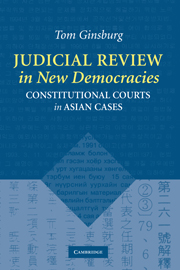Book contents
- Frontmatter
- Contents
- Acknowledgments
- Notes on Usage
- Judicial Review in New Democracies
- Introduction: The Decline and Fall of Parliamentary Sovereignty
- 1 Why Judicial Review?
- 2 Constituting Judicial Power
- 3 Building Judicial Power
- 4 Courts in New Democracies
- 5 Confucian Constitutionalism? The Grand Justices of the Republic of China
- 6 Distorting Democracy? The Constitutional Court of Mongolia
- 7 Rule by Law or Rule of Law? The Constitutional Court of Korea
- 8 Conclusion: Comparing Constitutional Courts
- Bibliography
- Index
6 - Distorting Democracy? The Constitutional Court of Mongolia
Published online by Cambridge University Press: 21 July 2009
- Frontmatter
- Contents
- Acknowledgments
- Notes on Usage
- Judicial Review in New Democracies
- Introduction: The Decline and Fall of Parliamentary Sovereignty
- 1 Why Judicial Review?
- 2 Constituting Judicial Power
- 3 Building Judicial Power
- 4 Courts in New Democracies
- 5 Confucian Constitutionalism? The Grand Justices of the Republic of China
- 6 Distorting Democracy? The Constitutional Court of Mongolia
- 7 Rule by Law or Rule of Law? The Constitutional Court of Korea
- 8 Conclusion: Comparing Constitutional Courts
- Bibliography
- Index
Summary
INTRODUCTION
In contrast with Taiwan's gradual transition, Mongolia presents a useful context for examining the position of a constitutional court created after a clear “constitutional moment.” Since 1990, Mongolia's democratization process has been unparalleled in socialist Asia and is as muscular as any postcommunist society in Europe. Several free and fair elections have been held, a new constitution with extensive human rights provisions ratified, and the formerly Leninist Mongolian People's Revolutionary Party (MPRP) has alternated turns in power with younger democratic parties. By any definition of the slippery concept of democratic consolidation, Mongolia has achieved it.
The new constitutional court, called the Tsets, initially played an important role in this process, constraining legislative majorities and building up a body of constitutional law in a society where socialist traditions of parliamentary sovereignty had previously held sway. As democratic institutions developed, however, the court was increasingly criticized for making overly political decisions. Ultimately, the court provoked a constitutional crisis and found itself increasingly politicized from outside.
Much of the controversy surrounding the court can be traced back to a single decision in 1996 that thrust the court into the center of heated political battle. This was the decision on the structure of government, issued immediately following the historic electoral victory of the National Democrat–Social Democrat coalition. That electoral victory had ended seventy-two years of continuous rule by the Mongolian People's Revolutionary Party (MPRP), the former communist party that had tried to steer post-1990 reforms.
- Type
- Chapter
- Information
- Judicial Review in New DemocraciesConstitutional Courts in Asian Cases, pp. 158 - 205Publisher: Cambridge University PressPrint publication year: 2003



